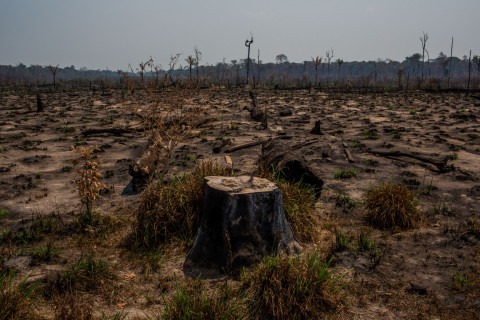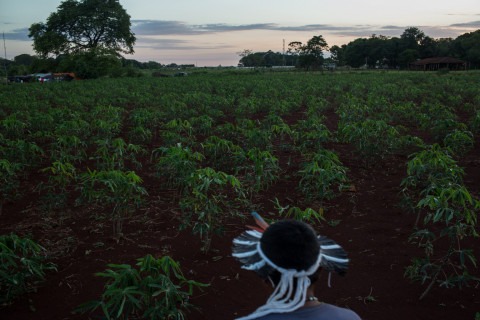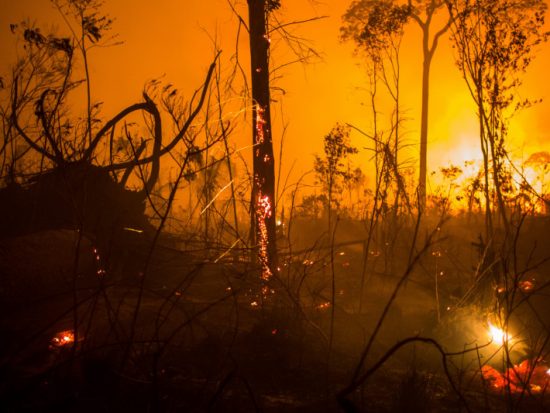Lungs on fire
Today, more than ever, the Amazon rainforest, the “lungs of our planet”, is in smoke and flames. Unlike the recent wildfires in the Arctic, most of the fires in the Amazon are not natural, but caused by humans. The forest is set on fire in order to clear land for various purposes, notably farming and cattle breeding.
The Amazon is the home of indigenous people and a sanctuary for luxurious and vital ecosystems. Burning it is a human and an environmental crime – and a new trade agreement would pour gasoline on these fires.

Partners in crime: How the EU-Mercosur trade agreement would boost deforestation
The European Commission has recently concluded a trade deal with Mercosur countries (Argentina, Brazil, Paraguay and Uruguay) which, if ratified, would be the biggest trade deal both blocs ever implemented in terms of the number of citizens involved.
The trade agreement will be on the agenda of the EU Council this autumn. It will increase trade between the EU and Mercosur in beef and ethanol, main drivers of deforestation:
- The deal will increase beef imports to the EU by 30%. Demand for beef is one of the biggest drivers of deforestation in Brazil where three football fields of Amazon forest are lost every minute. Forests are also being slashed for beef in Paraguay and Argentina.
- Ethanol drawn from sugarcane is being transformed into biofuel, used as an alternative to fossil fuels for transport. Sugarcane production is a major cause of deforestation. In 2019, the Brazilian government lifted a ban on growing sugarcane in the Amazon. Brazil is expected to provide nearly half of the growth in global ethanol production by 2025.
More demand for those products will mean more incentives for Brazilian farmers to burn the Amazonian forest for cattle, sugarcane, etc. And for Argentinian, Uruguayan and Paraguayan farmers to clear land for polluting and climate-wrecking agricultural practices.
Burning forests is burning the planet
Rainforests play a crucial role in the climate crisis. Absorbing emissions from the air, they can store vast amounts of carbon and other greenhouse gases that boost global heating. On the other hand, when these trees are burned, they release carbon dioxide into the atmosphere. Moreover, dry and burnt areas lead to a regional rise in temperature, creating ideal conditions for further and bigger fires.
The “cleared” land is often being used for intensive agricultural production, which accounts for 80% of global deforestation.
Deforestation means destroying people’s lives

Signing the trade deal will also condone the appalling human rights record of Brazil, and show support for a government that is undermining democracy and the rule of law. Workers’ rights will not be protected by the deal.
? “Rainforest mafias” linked to illegal logging and land grabbing and tolerated by Brazilian president Bolsonaro, have used intimidation and violence, including killings, against small farmers and indigenous communities who are an obstacle to their activities.
? Over the decade 2009-2019, 387 killings of land and environment defenders were reported in Brazil (figures by Global Witness). It is by far the country with most of such crimes. Impunity remains the norm, as these crimes are almost never investigated nor prosecuted.
But we can do things differently, we can produce as locally as possible. Agriculture around the globe does not have to be intensive and polluting, it can be ecological and small scale. We can respect indigenous peoples and not invade their traditional space and lifestyle.
To raise your voice against the trade deal and the agricultural model it represents, add your name to the petition against the EU-Mercosur trade agreement and share the information around you!
Related Content
We think you’d also like:

Stop the EU-Mercosur trade deal
The EU is close to finalising a climate-wrecking trade deal with Brazil, Argentina, Paraguay and Uruguay – known collectively as Mercosur. But there’s still time to stop it.







